GALLUP NEWS SERVICE
PRINCETON, NJ -- The public's immediate reaction to the recent shake-up in the Bush administration's economic team is lukewarm, with significantly less than a majority of Americans saying the changes make them more confident in the administration's ability to handle the economy. Americans' rating of the country's economic health remains low, and a majority says the economy is getting worse rather than better. Only 49% of Americans approve of the way the president is handling the issue, below the 63% who approve of his overall job performance. A majority of Americans, however, believe it is at least somewhat likely that the president and Congress will pass new economic legislation that will have a meaningful impact.
The Context
Most surveys of consumer confidence were slightly more positive in November than they had been in previous months, but the first Gallup ratings this month reveal no signs of any sustained positive momentum in Americans' views of the economy.
Only 25% of Americans now rate the U.S. economy as excellent or good, down from 32% just before Thanksgiving. The current ratings are essentially the same as those in August and September.
Also, by 54% to 35%, Americans say the nation's economic conditions are getting worse rather than better, essentially unchanged from the last few months.
| Rating of Current Economic Conditions |
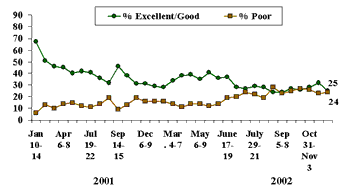 |
| Economic Conditions: Getting Better or Getting Worse? |
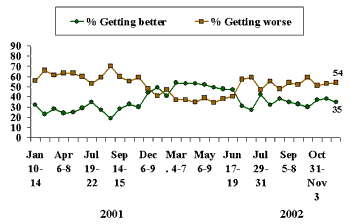 |
The public's current rating of President Bush's handling of the economy -- now at 49% -- is 14 points lower than his overall approval rating, and is below his ratings on foreign affairs and his handling of the situation in Iraq:
|
Bush Approval Ratings |
||
|
Approve |
Disapprove |
|
|
Overall job approval |
63% |
32 |
|
Foreign affairs |
59% |
35 |
|
Situation in Iraq |
55% |
39 |
|
Economy |
49% |
47 |
In the second year of his administration, in the fall of 1990, President George H.W. Bush also received a lower rating on handling the economy than on his overall job performance. Both presidents were heavily involved in a potential war with Iraq in the fall of their second year in office, and this focus on an external threat probably helped both keep their overall approval ratings high even as the public gave them lower marks for dealing with the economy.
By way of contrast, President Reagan's and President Clinton's overall and economic job approval ratings were much closer in 1982 and 1994, respectively, when each of these presidents had been in office for about 2 years. Neither Reagan nor Clinton faced a highly visible international threat in those years.
|
Overall Job Approval and Economic Approval
Ratings After 2 Years in Office: |
||
|
Overall Approval |
Approval of |
|
|
% |
% |
|
|
Ronald Reagan (Oct. 1982) |
42 |
36 |
|
George H.W. Bush (Oct. 1990) |
56 |
30 |
|
Clinton (Dec. 1994) |
42 |
43 |
|
George W. Bush (Dec. 2002) |
63 |
49 |
The current President Bush no doubt remembers that his father's job approval rating began to slip rapidly in 1991 and 1992, as the public's focus on the Persian Gulf War faded and Americans' attention to the faltering economy increased. It was ultimately the perceived bad economy that many observers believe was the most important factor in the elder Bush's defeat in the 1992 presidential election. This historical pattern may have helped prompt the current president's recent moves to shore up his economic team in preparation for the 2004 election campaign.
The public's perception of Bush's handling of the economy is now about where it was in the spring of 2001. (The economic rating shot up along with all other presidential approval ratings after the terrorist attacks of September 2001.) However, the public's perception of the national economy is now considerably lower than it was in the spring of 2001, suggesting that in other circumstances Bush's job approval rating on the economy would be lower now than it was in early 2001. This reinforces the conclusion that Bush's economic rating is to some degree being propped up by his more robust overall job approval rating and/or relatively high marks for handling foreign affairs.
| George W. Bush's Approval Ratings |
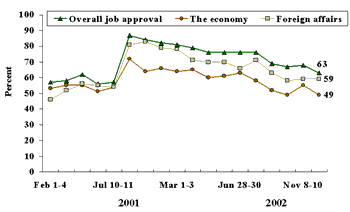 |
Basic Reaction to the Changes in the Bush Economic Team
Half of Americans say the recent changes in the Bush administration's economic team will make no difference in their perceptions of the Bush administration's "ability to deal with the economy." About a third say the changes make them more confident, while 16% say the changes make them less confident.
| Does Bush Replacing Economic Advisors Make You More Confident or Less Confident in the Administration's Ability to Handle the Economy? |
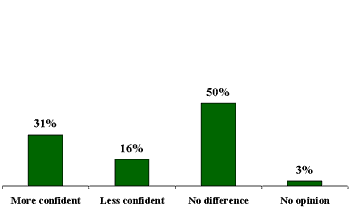 |
It comes as no surprise to find that the responses to this question are very partisan in nature. Republicans are the most likely to say the changes increase their confidence, while independents are most likely to say the changes make no difference:
|
Impact of Changes in Bush Economic Team on Confidence in Bush's Ability to Deal With the Economy |
||||
|
More confident |
Less confident |
No difference |
No opinion |
|
|
% |
% |
% |
% |
|
|
Republicans |
48 |
7 |
44 |
1 |
|
Independents |
26 |
14 |
57 |
3 |
|
Democrats |
17 |
28 |
51 |
4 |
Note that even Republicans are not overwhelmingly likely to say the changes make them more confident in the administration's ability to handle the economy. Two possible reasons: 1) Republicans already had very high levels of confidence in the president, so there was little room for these confidence levels to grow, or 2) even the president's own constituency has a wait-and-see attitude toward the impact of the changes.
Independents and Democrats are even less impressed than Republicans with the personnel changes, with majorities of each group saying the changes will have no impact on their evaluation of how well the Bush administration is handling the economy. Among those who say the changes will affect their views, independents are more likely to say the changes will have a positive effect, while Democrats are more likely to say they will have a negative effect.
Prospects for the Future
Will the president and the Republican Congress be able to come up with legislation that will have a meaningful impact on the nation's economic situation in the coming year? Only 22% of the American public says this is a very likely possibility, but another 44% say it is somewhat likely, leaving less than half -- 33% -- of Americans saying that it is not too likely or not at all likely that the president and Congress will produce meaningful economic legislation:
How likely do you think it is that President Bush and Congress will pass legislation that takes meaningful action to deal with nation's economic problems -- very likely, somewhat likely, not too likely, or not at all likely?
|
Very |
Somewhat likely |
Not too likely |
Not at all likely |
No |
||
|
2002 Dec 9-10 |
22% |
44 |
26 |
7 |
1 |
|
There are predictable partisan differences in responses to this question, with 84% of Republicans saying that it is at least somewhat likely that such legislation will be forthcoming, compared to only 49% of Democrats.
| How Likely Is It That the Bush Administration and Congress Will Pass Meaningful Economic Legislation? |
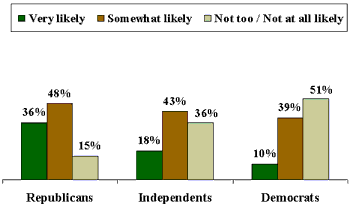 |
| Dec. 9-10, 2002 |
Survey Methods
The latest results are based on telephone interviews with 1,009 national adults, aged 18+, conducted Dec. 9-10, 2002. For results based on the total sample of national adults, one can say with 95% confidence that the margin of sampling error is ±3 percentage points. In addition to sampling error, question wording and practical difficulties in conducting surveys can introduce error or bias into the findings of public opinion polls.
Do you approve or disapprove of the way George W. Bush is handling his job as president?
|
|
Dis- |
No |
|
|
% |
% |
% |
|
|
2002 |
|||
|
2002 Dec 9-10 |
63 |
32 |
5 |
|
2002 Dec 5-8 |
64 |
29 |
7 |
|
2002 Nov 22-24 |
65 |
28 |
7 |
|
2002 Nov 11-14 |
66 |
26 |
8 |
|
2002 Nov 8-10 |
68 |
27 |
5 |
|
2002 Oct 31-Nov 3 |
63 |
29 |
8 |
|
2002 Oct 21-22 |
67 |
28 |
5 |
|
2002 Oct 14-17 |
62 |
31 |
7 |
|
2002 Oct 3-6 |
67 |
28 |
5 |
|
2002 Sep 23-26 |
68 |
26 |
6 |
|
2002 Sep 20-22 |
66 |
30 |
4 |
|
2002 Sep 13-16 |
70 |
26 |
4 |
|
2002 Sep 5-8 |
66 |
30 |
4 |
|
2002 Sep 2-4 |
66 |
29 |
5 |
|
2002 Aug 19-21 |
65 |
28 |
7 |
|
2002 Aug 5-8 |
68 |
26 |
6 |
|
2002 Jul 29-31 |
71 |
23 |
6 |
|
2002 Jul 26-28 |
69 |
26 |
5 |
|
2002 Jul 22-24 |
69 |
24 |
7 |
|
2002 Jul 9-11 |
73 |
21 |
6 |
|
2002 Jul 5-8 |
76 |
18 |
6 |
|
2002 Jun 28-30 |
76 |
19 |
5 |
|
2002 Jun 21-23 |
73 |
21 |
6 |
|
2002 Jun 17-19 |
74 |
20 |
6 |
|
2002 Jun 7-8 |
74 |
18 |
8 |
|
2002 Jun 3-6 |
70 |
23 |
7 |
|
2002 May 28-29 |
77 |
17 |
6 |
|
2002 May 20-22 |
76 |
17 |
7 |
|
2002 May 6-9 |
76 |
19 |
5 |
|
2002 Apr 29-May 1 |
77 |
20 |
3 |
|
2002 Apr 22-24 |
77 |
17 |
6 |
|
2002 Apr 8-11 |
75 |
20 |
5 |
|
2002 Apr 5-7 |
76 |
19 |
5 |
|
2002 Mar 22-24 |
79 |
17 |
4 |
|
2002 Mar 18-20 |
79 |
16 |
5 |
|
2002 Mar 8-9 |
80 |
14 |
6 |
|
2002 Mar 4-7 |
77 |
18 |
5 |
|
2002 Mar 1-3 |
81 |
14 |
5 |
|
2002 Feb 8-10 |
82 |
14 |
4 |
|
2002 Feb 4-6 |
82 |
14 |
4 |
|
2002 Jan 25-27 |
84 |
13 |
3 |
|
2002 Jan 11-14 |
83 |
13 |
4 |
|
2002 Jan 7-9 |
84 |
12 |
4 |
|
|
Dis- |
No |
|
|
2001 |
% |
% |
% |
|
2001 Dec 14-16 |
86 |
11 |
3 |
|
2001 Dec 6-9 |
86 |
10 |
4 |
|
2001 Nov 26-27 |
87 |
8 |
5 |
|
2001 Nov 8-11 |
87 |
9 |
4 |
|
2001 Nov 2-4 |
87 |
9 |
4 |
|
2001 Oct 19-21 |
88 |
9 |
3 |
|
2001 Oct 11-14 |
89 |
8 |
3 |
|
2001 Oct 5-6 |
87 |
10 |
3 |
|
2001 Sep 21-22 |
90 |
6 |
4 |
|
2001 Sep 14-15 |
86 |
10 |
4 |
|
2001 Sep 7-10 |
51 |
39 |
10 |
|
2001 Aug 24-26 |
55 |
36 |
9 |
|
2001 Aug 16-19 |
57 |
34 |
9 |
|
2001 Aug 10-12 |
57 |
35 |
8 |
|
2001 Aug 3-5 |
55 |
35 |
10 |
|
2001 Jul 19-22 |
56 |
33 |
11 |
|
2001 Jul 10-11 |
57 |
35 |
8 |
|
2001 Jun 28-Jul 1 |
52 |
34 |
14 |
|
2001 Jun 11-17 |
55 |
33 |
12 |
|
2001 Jun 8-10 |
55 |
35 |
10 |
|
2001 May 18-20 |
56 |
36 |
8 |
|
2001 May 10-14 |
56 |
31 |
13 |
|
2001 May 7-9 |
53 |
33 |
14 |
|
2001 Apr 20-22 |
62 |
29 |
9 |
|
2001 Apr 6-8 |
59 |
30 |
11 |
|
2001 Mar 26-28 |
53 |
29 |
18 |
|
2001 Mar 9-11 |
58 |
29 |
13 |
|
2001 Mar 5-7 |
63 |
22 |
15 |
|
2001 Feb 19-21 |
62 |
21 |
17 |
|
2001 Feb 9-11 |
57 |
25 |
18 |
|
2001 Feb 1-4 |
57 |
25 |
18 |
Next,
Do you approve or disapprove of the way George W. Bush is handling -- [ROTATED]?
A. The economy
|
Approve |
Disapprove |
No opinion |
|
|
% |
% |
% |
|
|
2002 Dec 9-10 |
49 |
47 |
4 |
|
2002 Nov 8-10 |
55 |
39 |
6 |
|
2002 Oct 21-22 |
49 |
44 |
7 |
|
2002 Jul 26-28 |
52 |
43 |
5 |
|
2002 Jul 5-8 |
58 |
36 |
6 |
|
2002 Jun 28-30 |
63 |
33 |
4 |
|
2002 May 20-22 |
61 |
29 |
10 |
|
2002 Apr 5-7 ^ |
60 |
33 |
7 |
|
2002 Mar 22-24 |
65 |
29 |
6 |
|
2002 Mar 1-3 |
64 |
31 |
5 |
|
2002 Feb 4-6 |
66 |
30 |
4 |
|
2002 Jan 25-27 |
64 |
30 |
6 |
|
2001 Nov 2-4 ^ |
71 |
24 |
5 |
|
2001 Oct 5-6 |
72 |
23 |
5 |
|
2001 Jul 10-11 |
54 |
36 |
10 |
|
2001 May 18-20 |
51 |
41 |
8 |
|
2001 Apr 20-22 ^ |
55 |
38 |
7 |
|
2001 Mar 9-11 |
55 |
32 |
13 |
|
2001 Feb 1-4 |
53 |
27 |
20 |
|
^ Asked of half sample. |
|||
B. Foreign affairs
|
Approve |
Disapprove |
No opinion |
|
|
% |
% |
% |
|
|
2002 Dec 9-10 |
59 |
35 |
6 |
|
2002 Nov 8-10 |
59 |
36 |
5 |
|
2002 Oct 21-22 |
58 |
35 |
7 |
|
2002 Jul 26-28 |
63 |
30 |
7 |
|
2002 Jul 5-8 |
71 |
25 |
4 |
|
2002 Jun 28-30 |
66 |
27 |
7 |
|
2002 May 20-22 |
70 |
23 |
7 |
|
2002 Apr 5-7 ^ |
70 |
24 |
6 |
|
2002 Mar 22-24 |
71 |
22 |
7 |
|
2002 Mar 1-3 |
78 |
17 |
5 |
|
2002 Feb 4-6 |
79 |
16 |
5 |
|
2002 Jan 25-27 |
83 |
14 |
3 |
|
2001 Oct 5-6 |
81 |
14 |
5 |
|
2001 Jul 10-11 |
54 |
33 |
13 |
|
2001 May 18-20 |
55 |
35 |
10 |
|
2001 Apr 20-22 ^ |
56 |
31 |
13 |
|
2001 Mar 9-11 |
52 |
27 |
21 |
|
2001 Feb 1-4 |
46 |
21 |
33 |
|
^ Asked of half sample. |
|||
C. The situation with Iraq
|
Approve |
Disapprove |
No opinion |
|
|
% |
% |
% |
|
|
2002 Dec 9-10 |
55 |
39 |
6 |
|
2002 Oct 21-22 |
52 |
40 |
8 |
How likely do you think it is that President Bush and Congress will pass legislation that takes meaningful action to deal with nation's economic problems -- very likely, somewhat likely, not too likely, or not at all likely?
|
Very |
Somewhat likely |
Not too likely |
Not at all likely |
No |
||
|
2002 Dec 9-10 |
22% |
44 |
26 |
7 |
1 |
|
Next,
How likely do you think it is that President Bush and Congress will pass legislation that takes meaningful action to deal with nation's healthcare problems -- very likely, somewhat likely, not too likely, or not at all likely?
|
Very |
Somewhat likely |
Not too likely |
Not at all likely |
No |
||
|
2002 Dec 9-10 |
12% |
32 |
37 |
17 |
2 |
|
As you may know, President Bush is replacing two of his top economic advisors. Does this make you more confident or less confident in the Bush administration's ability to deal with the economy, or does it not make any difference?
|
More confident |
Less confident |
No difference |
No opinion |
|
|
2002 Dec 9-10 |
31% |
16 |
50 |
3 |
